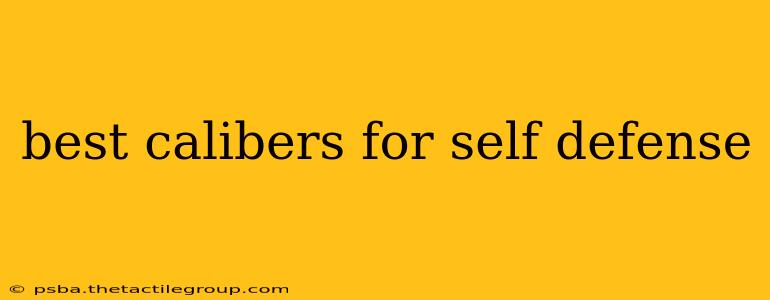Choosing the right caliber for self-defense is a crucial decision, demanding careful consideration of various factors beyond simple stopping power. This guide dives deep into the most popular calibers, analyzing their strengths, weaknesses, and suitability for different scenarios, helping you make an informed choice. Remember, this information is for educational purposes only; always check your local laws and regulations regarding firearm ownership and usage.
Factors to Consider Beyond Caliber
Before we delve into specific calibers, it's vital to understand that the caliber itself is only one piece of the puzzle. Effective self-defense relies on several interconnected elements:
- Shot Placement: Accurate shot placement is paramount, regardless of caliber. A well-placed shot from a smaller caliber can be far more effective than multiple poorly placed shots from a larger one. Training is crucial.
- Ammunition Selection: The type of ammunition (e.g., hollow point, full metal jacket) significantly impacts its effectiveness. Hollow point rounds are generally preferred for self-defense due to their increased expansion and energy transfer.
- Firearm Reliability: A reliable firearm that functions flawlessly under stress is essential. Choose a firearm known for its dependability and consider regular maintenance.
- Personal Physical Capabilities: Consider your physical strength and ability to handle recoil. A larger caliber might be too powerful for some individuals, leading to reduced accuracy and control.
- Training: Consistent and rigorous training is the most critical aspect of self-defense. Practice with your chosen firearm and ammunition until you are proficient and comfortable.
Popular Calibers for Self-Defense: A Detailed Look
Now, let's explore some of the most commonly used calibers for self-defense:
9mm Luger (9x19mm Parabellum):
- Pros: Excellent balance of stopping power, manageable recoil, high capacity magazines, widely available ammunition, and relatively inexpensive. This is a popular choice for both law enforcement and civilians.
- Cons: Can lack the stopping power of larger calibers in certain situations.
.45 ACP (11.43x23mm):
- Pros: Significant stopping power, large diameter bullet, and substantial energy transfer. Often perceived as a "one-shot stopper," though this is not guaranteed.
- Cons: Higher recoil than 9mm, lower capacity magazines, and more expensive ammunition.
.40 S&W (10x22mm):
- Pros: Good balance between stopping power and recoil, higher capacity magazines than .45 ACP. Often considered a compromise between 9mm and .45 ACP.
- Cons: Can still have noticeable recoil, and ammunition can be more expensive than 9mm.
.380 ACP (9x17mm):
- Pros: Small and lightweight, easy to conceal, manageable recoil, making it suitable for smaller individuals. Relatively easy to shoot accurately.
- Cons: Limited stopping power compared to larger calibers, and less effective at longer ranges. Best suited for close-quarters self-defense.
10mm Auto:
- Pros: Extremely powerful, substantial stopping power. The 10mm is a serious round, offering a great deal of stopping power.
- Cons: High recoil, can be difficult to control for some shooters, and expensive ammunition.
Conclusion: The Best Caliber is the One You Can Handle Effectively
Ultimately, the "best" caliber for self-defense is subjective and depends on individual factors. There is no single perfect answer. Focus on choosing a caliber that you can shoot accurately and consistently under stress, with ammunition you can comfortably and reliably obtain. Prioritize proper training, consistent practice, and a thorough understanding of your firearm and its limitations. Remember to always prioritize safety and comply with all applicable laws and regulations.

